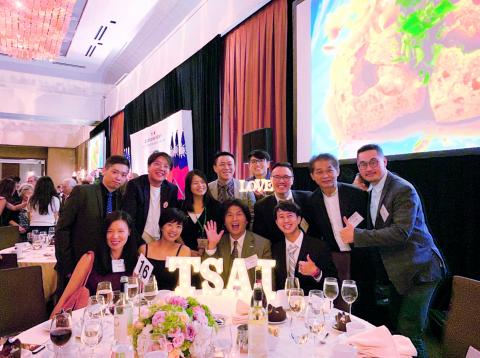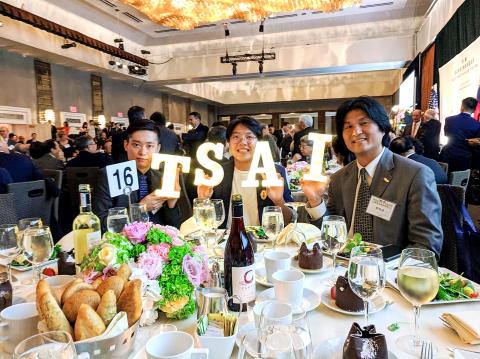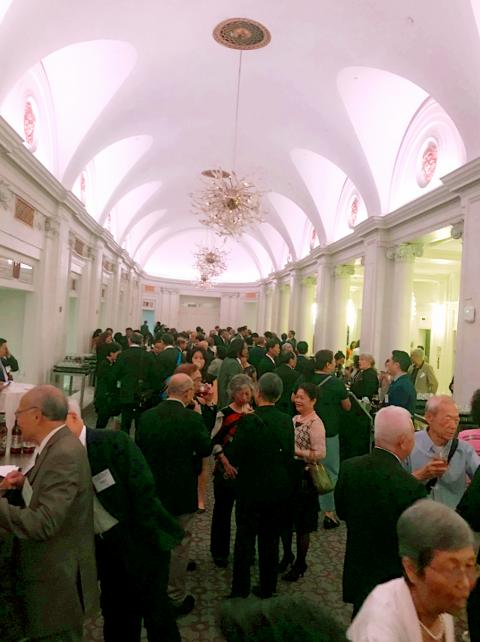For much of his life, Lai Hong-tien (賴弘典) has fought to improve Taiwan’s visibility on the international stage.
A recently retired dentist, Lai came to the US in 1967 as a student, was allegedly blacklisted by the Chinese Nationalist Party (KMT) government during martial law and later founded a group that promotes Taiwan’s membership in the UN.
Now in his late 70s, Lai got to witness something last week that he said showed him just how strong relations have grown between the US and Taiwan — President Tsai Ing-wen’s (蔡英文) two-night transit in New York City over the strenuous objections of China.

Photo courtesy of Darren Yang
“This is an achievement of President Tsai,” Lai said before the start of a dinner banquet on Friday at the Grand Hyatt New York, where Tsai addressed around 1,070 attendees.
Excitement was palpable over Tsai’s visit, part of a larger 12-day journey to four Caribbean diplomatic allies, as supporters waited to take their seats in the Empire State Ballroom and listen to the president speak.
Tsai told the audience, which included members of the US Congress, that Taiwan is determined to safeguard its sovereignty and that Taiwan’s government “will resolutely defend our freedom, democracy and way of life.”

Photo courtesy of Darren Yang
“Freedom is irrevocably ingrained in every aspect of our lives, in our freedom of speech, freedom of the press, freedom of religion, freedom of expression and most certainly, the freedom to run for office and exercise our right to vote,” Tsai said to applause.
Christina Hu (胡若涵), a civic engagement director with the nonprofit Taiwanese American Citizens League, called Tsai’s appearance in the US “quite miraculous.”
“It’s something that everybody else takes for granted, that they have their president that can visit,” she said. “For us, it has not been something that we can take for granted.”

Photo courtesy of Darren Yang
PUSH BACK
Beijing fumed over Tsai’s transit in New York, her first-ever as president.
“We urge the US to abide by the one-China principle and the three China-US Joint Communiques, not allow Tsai Ing-wen’s transit and stop the official exchange with Taiwan,” Chinese foreign ministry spokesman Geng Shuang (耿爽) said at a daily briefing Friday.

Photo courtesy of Darren Yang
The Global Times, the Chinese Communist Party’s mouthpiece, also accused the US of “using Taiwan as a card against the Chinese mainland,” claiming Tsai’s transit through America was related to the US-China trade war.
“Tsai is nothing more than a puppet controlled by Washington,” the newspaper declared in a July 12 article.
After visiting the four Caribbean allies, Tsai is expected to stop for two nights in Denver, Colorado, before heading home.
Back in New York, across the street from the Grand Hyatt near Manhattan’s iconic Grand Central Station, pro-Beijing demonstrators assembled by the hundreds on Thursday and Friday.
The New York Police Department corralled them behind metal barricades where they waived Chinese and American flags, shouted slogans in Mandarin and held up signs including one that said “Taiwanese Independence Is A Dead End” (台獨是死路一條).
“I feel that’s ridiculous, really ridiculous, because Taiwan is Taiwan, obviously,” said Kiki Lee Park (李翌琦), New York Metro chapter regional director of the Formosan Association for Public Affairs (台灣人公共事務會), referring to the protests.
Video posted online appeared to show some pro-China demonstrators on Thursday scuffling with Taiwan supporters outside the hotel. At least one man appeared to be taken into police custody.
STRONGER THAN EVER
Many who came to see Tsai speak Friday said they believe US-Taiwan relations have strengthened in recent years, as China continues to squeeze Taiwan’s international space and poaches its dwindling number of diplomatic allies, leaving it with 17.
But for some Taiwanese Americans, it has been a challenge reconciling that this comes during the presidency of Donald Trump, who has been a polarizing figure in the US and abroad.
One US member of Congress who welcomed Tsai in New York said support for the island nation of 23 million cuts across party lines.
“American support for Taiwan and the deep-seated relationship our people have cultivated, our friendship, has always been and will continue to be an issue on which there will be unwavering, bipartisan support,” said US Representative Eliot Engel, chairman of the House Foreign Affairs Committee. “The people of Taiwan will always have a friend in the US Congress.”
For its part, Congress last year passed the Taiwan Travel Act, which allows senior US officials to travel to Taiwan and vice-versa. Trump, who made headlines after accepting a congratulatory call from Tsai in 2016 after he was elected, signed the legislation into law last year.
The US House of Representatives in May also passed the Taiwan Assurance Act, introduced by US Representative Michael McCaul, ranking member of the US House of Representatives Foreign Affairs Committee. And it agreed to House Resolution 273, sponsored by Engel.
The act aims to deepen and expand US-Taiwan relations by eliminating excessive diplomatic restrictions at the State Department. The resolution reaffirms America’s commitment to Taiwan and the Taiwan Relations Act, which was signed into law in 1979 and governs US relations with Taiwan.
In January, the House also passed a bill sponsored by US Representative Ted Yoho, who attended Friday’s event, to help Taiwan regain observer status at the World Health Organization.
Meanwhile, the US Department of State this month approved a US$2.2 billion possible arms sale to Taiwan, prompting China to announce it would sanction any US firm that sells weapons to the island nation.
At a VIP gathering before the banquet, US Senator Bob Menendez, ranking member of the Senate Foreign Relations Committee, said he’s looking forward to the next round of military supplies for Taiwan that they’ll play a role in approving, as well as advocating for a free trade agreement between the US and Taiwan.
ELECTABILITY
With roughly a half year to go before Taiwan’s 2020 presidential election, things may be looking up for Tsai.
Around 48 percent of the country approved of how she’s been handling state affairs, according to a survey in late June by the Taiwanese Public Opinion Foundation. That’s almost a five percentage point increase since May and a 13 point jump since April.
The poll also found that Tsai would prevail in a three-way match with Taipei Mayor Ko Wen-je (柯文哲) and Kaohsiung Mayor and KMT presidential candidate Han Kuo-yu (韓國瑜).
Still, Tsai ranked third out of five candidates for favorability among respondents. Topping the list was William Lai (賴清德), the former premier who lost to Tsai in the Democratic Progressive Party primary, followed by Ko, an independent. KMT’s Gou and Han came in fourth and fifth, respectively.
Hsu Bo-cheng (許伯丞), a longtime community volunteer who attended Tsai’s banquet, said the president’s two-night stay in New York indicates to him that the US government has given Tsai enough trust and support.
“As we know, the purpose of this trip is to visit the Caribbean allies,” he said. “But the main focus is on the stay in the US.”
Hsu, who was born in Taiwan and lives in New York, said that while some have criticized Tsai for being scholarly, he believes she is careful and is doing the best for Taiwan.
“I will definitely make the trip back to Taiwan with the family to vote for her,” he said.

On April 26, The Lancet published a letter from two doctors at Taichung-based China Medical University Hospital (CMUH) warning that “Taiwan’s Health Care System is on the Brink of Collapse.” The authors said that “Years of policy inaction and mismanagement of resources have led to the National Health Insurance system operating under unsustainable conditions.” The pushback was immediate. Errors in the paper were quickly identified and publicized, to discredit the authors (the hospital apologized). CNA reported that CMUH said the letter described Taiwan in 2021 as having 62 nurses per 10,000 people, when the correct number was 78 nurses per 10,000

As Donald Trump’s executive order in March led to the shuttering of Voice of America (VOA) — the global broadcaster whose roots date back to the fight against Nazi propaganda — he quickly attracted support from figures not used to aligning themselves with any US administration. Trump had ordered the US Agency for Global Media, the federal agency that funds VOA and other groups promoting independent journalism overseas, to be “eliminated to the maximum extent consistent with applicable law.” The decision suddenly halted programming in 49 languages to more than 425 million people. In Moscow, Margarita Simonyan, the hardline editor-in-chief of the

Six weeks before I embarked on a research mission in Kyoto, I was sitting alone at a bar counter in Melbourne. Next to me, a woman was bragging loudly to a friend: She, too, was heading to Kyoto, I quickly discerned. Except her trip was in four months. And she’d just pulled an all-nighter booking restaurant reservations. As I snooped on the conversation, I broke out in a sweat, panicking because I’d yet to secure a single table. Then I remembered: Eating well in Japan is absolutely not something to lose sleep over. It’s true that the best-known institutions book up faster

Though the total area of Penghu isn’t that large, exploring all of it — including its numerous outlying islands — could easily take a couple of weeks. The most remote township accessible by road from Magong City (馬公市) is Siyu (西嶼鄉), and this place alone deserves at least two days to fully appreciate. Whether it’s beaches, architecture, museums, snacks, sunrises or sunsets that attract you, Siyu has something for everyone. Though only 5km from Magong by sea, no ferry service currently exists and it must be reached by a long circuitous route around the main island of Penghu, with the